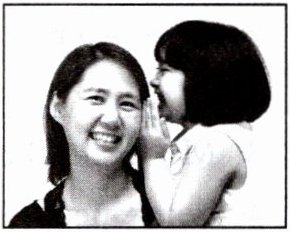四、阅读理解
I've noticed that conversations with my children have started to turn into something that I don't like. It could be my fault(过错). I don't always think before I open my mouth.
For example,my kids would call me to tell me about something that's been worrying them. Then,as soon as they've finished,I go into mum mode(模式). I can't help it. It's my default setting(默认设置).
“You should...” “You need to consider...” “Have you thought of...” “If I were you,I'd...”
“Mum!” The tone(语气)is full of frustration(沮丧)and anger. The meaning is obvious(明显的)— “Stop!”
I am the queen of unwanted advice. When I get one of my adult kids on the phone,I become an expert(专家)on everything and anything,which I'm obviously not.
I want to be part of their lives. More importantly,I want to prevent them from making mistakes that seem so obvious to me. But they just want a listening ear and an open heart.
I'm hardly alone in this. Over lunch the other day,a friend told me that her son rarely listened to anything she said. “It's like talking to a wall,” she added.
I know that feeling all too well. But I'm learning — very slowly — that talking at is not the same as talking with.
Giving advice to children can be full of problems. Though we may see ourselves sharing the wisdom of our years,they see something else. They see a controlling parent who hasn't accepted the fact that they're adults with their own thoughts and feelings.
They're not looking for any tips or advice. They may not even want an immediate(立刻的)solution(解决办法)to a difficult problem. What they're hoping for is a safe place to talk with a person who loves and supports them no matter what.
Because of this,I've given myself the goal(目标)of becoming a better parent by being a better listener. It's not an easy task for parents like me who think they're just being helpful. But I'm determined(坚定的),and I'm strong.

(
C
)1. What can we know about the writer's “mum mode”?
A. It's the best way of communication.
B. Her kids like it very much.
C. It's just hard for her to stop it.
D. It makes her and her children close.
(
D
)2. Why can giving advice to children cause problems?
A. Because the advice cannot solve the problem.
B. Because children can't learn to be independent(独立的).
C. Because parents love to show off their wisdom.
D. Because parents and kids want different things.
(
B
)3. What has the writer finally decided to do?
A. Be more helpful. B. Lend a listening ear.
C. Be patient when talking. D. Stop giving any advice.